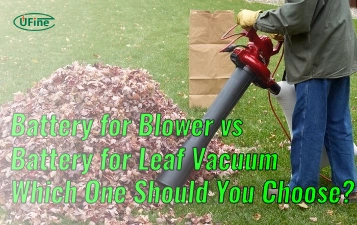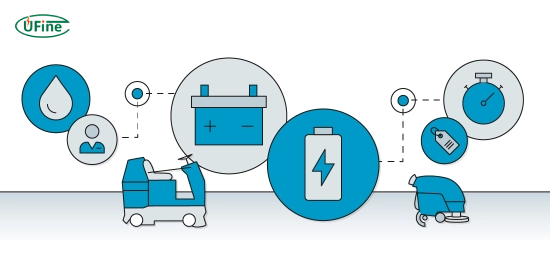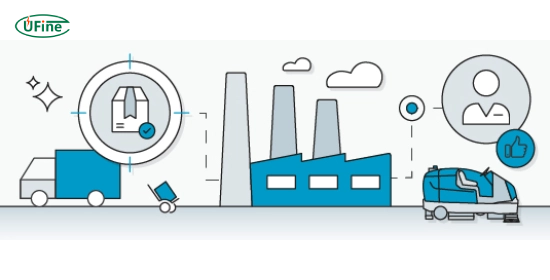Choosing the best floor scrubber battery for commercial cleaning can be the difference between efficient operations and constant downtime. In fast-paced commercial environments, such as warehouses, airports, shopping malls, and hospitals, floor scrubbers must work efficiently and quickly. But without a reliable battery, even the most advanced scrubber becomes just a heavy piece of equipment.
So, what is the best battery for a floor scrubber? The best battery delivers extended run time, low maintenance, fast charging, and durability, while matching your specific machine’s voltage and power needs. This guide will help you choose for your commercial cleaning business.
Part 1. What is a floor scrubber battery?
A floor scrubber battery powers the motor, brushes, and vacuum system in a battery-operated cleaning machine. These machines are used for deep cleaning and polishing large floor areas without a constant power supply.
Unlike traditional corded machines, battery-powered scrubbers offer better mobility and safety. But the battery is the heart of the machine. If the battery underperforms, the entire cleaning process suffers. That’s why the battery selection process is critical.
Part 2. Why is battery choice important for commercial cleaning?
In commercial cleaning, the quality of your battery affects everything:
- Downtime: A low-quality battery may not last an entire shift.
- Labor costs: Workers waste time recharging or replacing batteries.
- Machine performance: Weak batteries reduce suction and brush speed.
- Operational efficiency: Frequent charging disrupts productivity.
- Total cost of ownership: Cheap batteries may need frequent replacement.
Choosing the correct battery means smoother operations, longer cleaning cycles, and lower long-term costs.
Part 3. What are the main types of floor scrubber batteries?
There are three major types of batteries used in commercial floor scrubbers:
1. Flooded Lead-Acid Batteries
Also called “wet-cell batteries,” these are the most common and affordable.
Pros: Low initial cost, widely available.
Cons: Require regular maintenance (topping off water), heavier, emit fumes during charging.
2. AGM (Absorbed Glass Mat) Batteries
AGM is a sealed lead-acid battery that uses fiberglass mats to hold the electrolyte.
Pros: Maintenance-free, spill-proof, safer to use indoors.
Cons: Higher cost than flooded batteries, shorter lifespan than lithium.
3. Lithium-Ion Batteries
These are the most advanced and efficient batteries available today.
Pros: Lightweight, maintenance-free, fast charging, long cycle life, no emissions.
Cons: Higher upfront cost but greater long-term value.
Part 4. How do you know which battery type is right for you?
Choosing the correct battery depends on your cleaning needs and operational priorities:
| Need | Best Option |
|---|---|
| Low initial cost | Flooded Lead-Acid |
| No maintenance | AGM or Lithium-Ion |
| Fast charging | Lithium-Ion |
| Long battery life | Lithium-Ion |
| Indoor air safety | AGM or Lithium-Ion |
| Lightweight & compact design | Lithium-Ion |
Lithium-ion is likely the best investment if your business runs multiple cleaning shifts per day or if your machines work in sensitive indoor environments.
Part 5. What is battery voltage, and why does it matter?
Voltage determines the amount of power your battery delivers. Most commercial floor scrubbers operate with:
- 24V systems (two 12V batteries)
- 36V or 48V systems for bigger machines
Always check your machine’s manual to confirm the voltage requirement. Using the wrong voltage can:
- Damage internal components
- Reduce cleaning effectiveness
- Void your warranty
Also, ensure the battery size and weight are compatible with your scrubber’s battery compartment.
Part 6. What is battery capacity, and how does it affect performance?
Battery capacity is measured in amp-hours (Ah). It represents the amount of charge the battery can store. A higher Ah rating means the battery can power your scrubber for a longer period.
For example:
- A 100Ah battery can deliver 10 amps for 10 hours, in theory.
- A 200Ah battery offers twice the runtime under the same conditions.
Floor scrubbers used in large spaces or for extended shifts require higher Ah batteries to prevent mid-job interruptions.
Part 7. How long do floor scrubber batteries last?
Battery lifespan depends on:
- Battery type
- Charging habits
- Maintenance routine
- Operating environment
Here’s a general estimate:
| Battery Type | Lifespan (Years) | Charge Cycles |
|---|---|---|
| Flooded Lead-Acid | 1.5 – 3 years | 300 – 500 |
| AGM | 3 – 5 years | 500 – 800 |
| Lithium-Ion | 5 – 7+ years | 1500 – 3000+ |
Improper charging, deep discharges, and overheating can significantly reduce your battery’s lifespan. That’s why smart chargers and proper storage are essential.
Part 8. What are the key features to look for in a floor scrubber battery?
When choosing a battery, focus on more than just price. Look for:
- High cycle life: More charge/recharge cycles = longer battery life.
- Fast recharge time: Reduces downtime between shifts.
- Maintenance-free operation: Saves time and labor.
- Low self-discharge rate: Holds charge even during storage.
- Built-in safety features: Essential for lithium batteries.
- Weight and size compatibility: Match your machine’s specs.
- Strong warranty and support: Protects your investment.
Also, consider environmental certifications, primarily if you work in hospitals or food-safe zones.
Part 9. How to properly maintain your floor scrubber battery?
Maintenance depends on battery type:
For Flooded Lead-Acid:
- Check water levels weekly
- Clean terminals regularly
- Charge entirely after each use
- Avoid deep discharges
- Store in a cool, dry place
For AGM and Lithium-Ion:
- Charge after every shift
- Avoid overcharging
- Use manufacturer-approved chargers
- Keep away from extreme heat or cold
Proper care can double the battery’s life span.
Part 10. Where to buy reliable floor scrubber batteries?
You can buy floor scrubber batteries from:
- OEMs (Original Equipment Manufacturers)
- Industrial battery suppliers
- Online retailers like Amazon, BatteryStuff, and CleanFreak
- Authorized service centers
For high-quality, customized lithium battery solutions, consider Ufine Battery. Ufine specializes in custom lithium-ion battery packs for industrial and commercial cleaning equipment.
Why choose Ufine Battery?
- Tailored battery design based on your scrubber’s requirements
- Advanced battery management systems (BMS) for safety and performance
- High energy density for longer runtime in compact form
- Fast charging capabilities
- Global shipping and OEM support
Suppose you need a battery that fits your power, size, and performance needs. In that case, Ufine can engineer a solution tailored to your needs.
Part 11. FAQs about floor scrubber battery
What is the best battery for a commercial floor scrubber?
Lithium-ion batteries are the best overall due to their high energy density, long lifespan, and zero maintenance. However, AGM batteries offer a solid alternative for those on a tighter budget.
How long does it take for a floor scrubber battery to charge?
- Flooded Lead-Acid: 8–12 hours
- AGM: 6–10 hours
- Lithium-Ion: 2–4 hours (with fast charger)
Can I upgrade my floor scrubber to a lithium-ion model?
Yes, many machines can be upgraded—but check compatibility first. You may need a new charger or battery management system.
What’s the difference between deep-cycle and starter batteries?
Deep cycle batteries release power slowly over time—ideal for floor scrubbers. Starter batteries deliver a quick burst of power, similar to what is used in cars, which is unsuitable for scrubbers.
How do I dispose of old scrubber batteries?
Take them to a certified recycling center. Never throw batteries in the trash. Many suppliers offer battery recycling programs.
Related Tags:
More Articles

Battery for Blower vs Battery for Leaf Vacuum: Which One Should You Choose?
Battery for blower vs leaf vacuum—learn the key differences in power, fit, and runtime to choose the right battery for your outdoor tool needs.
How to Choose the Right Battery for Blower?
Choosing the right blower battery? Consider voltage, capacity, chemistry & usage. This guide helps match the best battery for peak performance.
How to Choose the Best Insulated Battery Box for Lithium Batteries?
Choosing the Best Insulated Battery Box for Lithium Batteries? Discover key factors such as size, material, and safety for optimal protection and performance.
7 Critical Elements on a Lithium Battery Shipping Label
What must be on a lithium battery shipping label? Learn 7 key elements to ensure safety, legal compliance, and correct handling across all transport modes.
UN3481 vs UN1323: Classification Guide for Lithium Batteries
UN3481 vs UN1323: UN3481 is for lithium batteries in equipment, while UN1323 covers flammable solids and doesn't apply to batteries.





